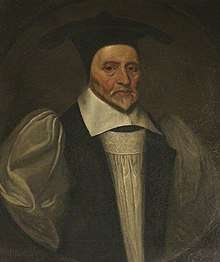Robert Sanderson (theologian)
Robert Sanderson (19 September 1587 – 29 January 1663) was an English theologian and casuist.
Robert Sanderson | |
|---|---|
| Bishop of Lincoln | |
 Robert Sanderson by John Riley | |
| Church | Church of England |
| Diocese | Diocese of Lincoln |
| In office | 1660–1663 |
| Predecessor | Thomas Winniffe |
| Successor | Benjamin Lany |
| Personal details | |
| Born | 19 September 1587 Sheffield |
| Died | 29 January 1663 (aged 75) |
| Buried | St Mary's Church, Buckden |
| Denomination | Anglican |
| Spouse | Ann Nelson |
| Alma mater | Lincoln College, Oxford |
He was born in Sheffield in Yorkshire and grew up at Gilthwaite Hall, near Rotherham.[1] He was educated at Lincoln College, Oxford. Entering the Church, he rose to be Bishop of Lincoln.
His work on logic, Logicae Artis Compendium (1615), was long a standard treatise on the subject. It enjoyed at least ten editions during the seventeenth century and was widely read as a textbook. Sanderson's biographer, Izaak Walton writes that by 1678 'Logicae' had sold 10,000 copies. In her introduction to the 1985 facsimile edition E. J. Ashworth writes that "The young Isaac Newton studied Sanderson's logic at Cambridge, and as late as 1704." Thomas Heywood of St. John's College, Ashworth adds, recommended Newton "Sanderson or Aristotle himself". Sanderson's logic remained popular even after the appearance of the influential Port-Royal Logic.
Sanderson's sermons were also admired; but he is perhaps best remembered for his Nine Cases of Conscience Resolved (1678), in consideration of which he has been placed at the head of English casuists. He left large collections of historical and heraldic matter in MS.
Sanderson is today perhaps best known as the subject of one of Izaak Walton's Lives, published in 1678.
Works
- The Works of Robert Sanderson in Six Volumes (1854) edited by William Jacobson. Oxford at the University Press. Most volumes are available in full or partial views in Google Books.
- Logicae Artis Compendium, edited by E. J. Ashworth. Bologna: Editrice CLUEB, 1985. Also published as vol.VI in 'The Works of Robert Sanderson in Six Volumes' W. Jacobson (ed).
References
![]()
![]()
- Odom, William (1926). "Bishops—Clergy—Ministers". Hallamshire worthies. Sheffield: Northend. pp. 30–31. OCLC 23581396.
External links
- Short biography at Rotherham.co.uk
- Works by Robert Sanderson at Open Library
- Archival Material at Leeds University Library
| Academic offices | ||
|---|---|---|
| Preceded by John Prideaux |
Regius Professor of Divinity at Oxford 1642–1648 |
Succeeded by Joshua Hoyle |
| Preceded by John Conant |
Regius Professor of Divinity at Oxford 1660–1661 |
Succeeded by William Creed |
| Church of England titles | ||
| Vacant Title last held by Thomas Winniffe |
Bishop of Lincoln 1660–1663 |
Succeeded by Benjamin Lany |